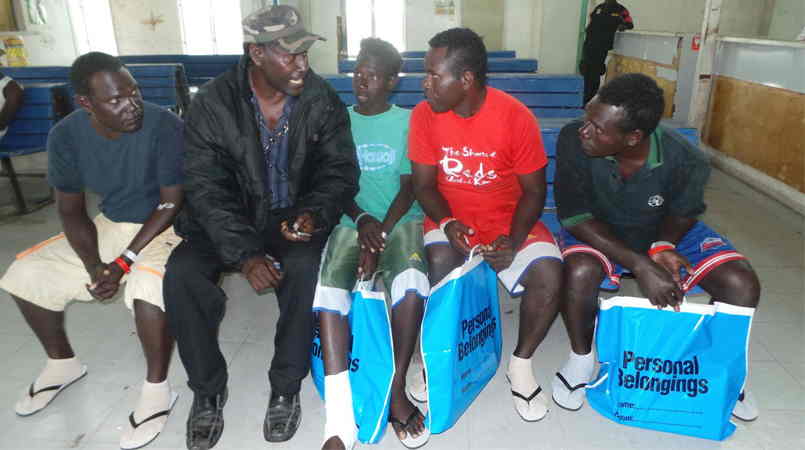
Two survivors of the boat that capsized in high seas between Carterets Island and Buka have told the story of how they survived the three day ordeal adrift in the vast Pacific Ocean.
Felicitas Kurangik and Nicholas Hakata told of their bravery against Mother Nature’s gruesome nightmare on them.
Felicitas Kurangik is a teacher and has a one year old baby, while Nicholas Hakata is the treasurer for Carterets Primary School and is a seafarer by profession having worked for Bismarck Maritime, on board vessel Sea Swallow and on board an international purseiner.
“We took off in the early hours of Saturday morning from Buka, then to Bonus at Kokopau on the other side of the Buka passage, to get Felicitas's baby," he said.
“The weather was really fine with only small sea swells.”
“We had two engines, one a 60 horse power and the other one a 40 horse powered engine as a spare one," Hakata said.
The boat had on board the head master, his female teacher Felicitas with her baby and a small amount of rations, which was packed on the boat and a reasonable amount of luggage and 9 passengers all bound for Carterets Island.
“We were on very high speed which is normal out in the open sea travelling at around 20 to 22 knots per hour," he said.
“According to the GPS (Global Positioning System) we were 24 miles closing in on the island when the skipper called for his substitute to take over and man the engine while he rested.”.
At exactly 19 miles out suddenly the 60 horse powered engine cut off. When the skipper slowed the 40hp engine down, the wave at the back of the boat crashed right in and the boat sank straight away. Luckily some things began floating up.
The rations and the plywood and the pallet which were used as the boat floor all floated up to the surface.
“The first thing that came across my mind was the baby; I quickly grabbed a couple of packets of twisties and put them in a lid covered bucket which I used as a floater.”
Mr.Hakata said: “We were all supposed to stick together as one group but the skipper swam away and up until now he hasn’t been found.”
They put the baby in the pallet and plywood while they all just clung to the new home made floater.
The incident happened at about 10 o’clock in the morning and all they were thinking of was death.
According to Felicitas she would breast feed her baby while clinging on the raft.
“I would breast feed the baby but not too much, and I would talk to the baby saying, we’re not at home we’re not on land, we’re adrift," she said.
Nicholas handed her a packet of twisties which was covered in salt water, but when she fed the baby the infant would just swallow it.
They spent the cold night until Sunday early morning when the first patch of light appeared; they heard a faint and distant sound of the US Mercy helicopter, then it appeared like a dot in the sky.
Another survivor took his white t shirt off and started waving but to no avail.
So they spent the whole day floating again and spent the cold Sunday night, with everybody suffering from dehydration, and it was also then that a second person went missing and is now presumed dead..
“It was on Monday morning that we saw birds flying from a certain direction so we just guessed it was the island so we swam with our last strength until we saw the horizon lose its serenity, and with the wind blowing in that direction we safely landed on Piul Island in the Carterets," Mr. Hakata said.
“Locals hurried over and dragged us onto the sand, boiled heated water and bathed us, then took us to the main island, Han Island and straight to the aid post.”
When it was reported that 7 of the survivors made it alive the US Mercy helicopter picked them up and flew them to the ship where they received medical treatment.
Then they were flown back to Buka airport where they are now.
